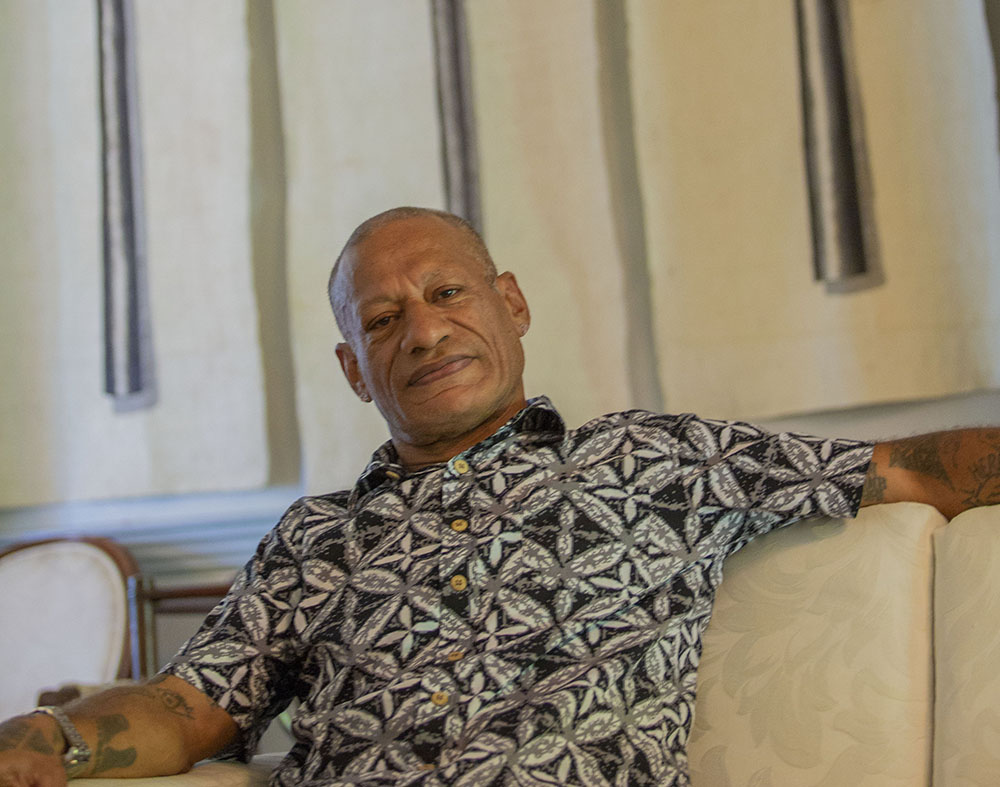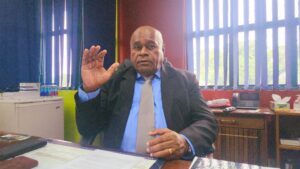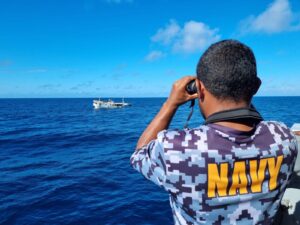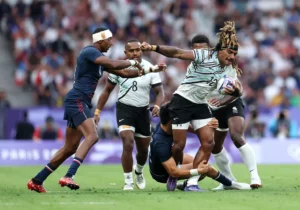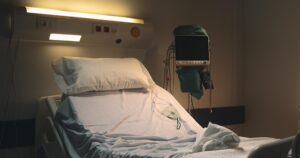Alifereti Malai is an award-winning local artist whose work has earned international respect and recognition.
The 54 year old artist, whose career spans four decades, has had his paintings exhibited at both public and private galleries not only in Fiji but also in New Caledonia, New Zealand, Australia, Germany, and the United States.
He was recently named Fiji’s 2019 Artist of the Year.
Despite his string of awards, Malai insists he is not in it for the accolades or the money. Art provided him an outlet to express his emotions and unleash his feelings and fears.
For Malai, art allows those are afraid to ventilate their feelings, identify with and experience shared joy, pain and release.
“The world would be crumbling around me, but I would be soaring like a bird,” says Malai about his art’s impact on his life. “I want others to feel the same joy and release I’ve found through art.”
In a life punctuated with episodic misfortune, he has defied many odds to reach where he has.
Malai grew up in the Suva home of an expatriate where his mother was employed as a domestic helper. Exposed to the books and paintings surrounding him, his appreciation of the arts was cultivated early.
When he was 5 years old, his parents got divorced and both he and his sister were despatched to Vanuabalavu to live with their maternal grandmother and attend primary school there. On the island he began delving into craft and drawing, influenced by his grandmother’s creative talents. “She was my first tutor,” says Malai.
He returned to Suva after his mother remarried and completed his final two years of primary education at Marist Brothers Primary School in Toorak, before going to Ratu Kadavulevu School (RKS) for his secondary education. After finishing fifth form, Malai switched to vocational studies in 1982 to do carpentry and joinery. During his time at RKS, he designed the school’s current uniform’s shirt. Before then, RKS students wore a plain white shirt.
Despite that artistic contribution, Malai was often the victim of bullying. He would find solace in painting, but only for a while. Peer pressure got the better of him and he “started following the wrong crowd in the streets.” His outlook on life became rather cynical. He reasoned that he would simply live from day to day. He saw no other hope.
Malai was not able to complete his first year of vocational studies because he was arrested, prosecuted and convicted for damaging property and being drunk and disorderly. He was sentenced to imprisonment in Nasinu – beginning his ten year stint in and out of prison until 1993.
Once released, he stayed at home for a while before straying back onto the streets. He would not return home for months.
“Hungry and covered with bruises, I would return home, bathe and eat. I became mute. The brokenness, the loneliness, the hurt and pain I carried with me from childhood and during my time on the streets, I would pour that out into my drawing. Drawing made me erase all of those feelings from my mind.”
During his years in confinement, drawing helped Malai maintain his sanity. His work caught the eye of prison officers and before long he was earning money from his paintings. His clients included the American Embassy who kept in touch with him through his final term in prison. In 1992, one of his paintings won a prize at the Red Cross Needle Craft and Hobby Fair.
His good behavior resulted in the reduction of his incarceration. After his release, Malai continued to paint; and began selling his works to Fijian hotels.
Malai was married in 1994 and became the father of two children, Heleina and Alifereti Malai Junior.
In 2006, Malai joined the Oceania Centre for Arts and Culture at the University of the South Pacific to learn about contemporary art. He began his first year there picking up major awards. His latest – the 2019 Artist of the Year Award – was presented to him by the French Ambassador to Fiji, Sujiro Seam, for his work with the Art and Hope program for female prisoners.
“Through art I tried to draw them out, to help them express themselves. In a short time they were sharing their secrets and unleashing their pain through art. They did not talk about it, they painted it … I think they were able to relate to me because of my experience,” Malai says of his work with female prisoners.
“Art became the voice of my thoughts. While everything else was changing around me, my art was the only constant … It gave me stability. I used it to release my emotions bottled up from childhood. In prison, it was my weapon. It allowed me survive … to get what I wanted. I was respected because of my art. Since my release, it became my source of income.”
His latest painting, entitled ‘Sleeping with the Enemy’, depicts violence against children and women by people they know, including their loved ones. Until this is rooted out, it will continue to flourish and be tolerated by victims accepting it as a way of life. Malai argues:
“We’ve always thought the enemy was somewhere out there, lurking in the dark and waiting to ensnare us. But, in fact the enemy is usually living with or close to us. The people whom we trust are usually the perpetrators of such despicable acts of violence against women and children.”
Malai also uses his art to confront topical issues in the region such as suicide, childhood pregnancy, traditional tukuni and climate change.
Malai has sold many paintings. He uses part of his earnings to buy school stationery for students from his home village in Burelevu in the Ra Highlands.
A recent exhibition held at the French Ambassador’s residence in Suva showcased some of his works. His next exhibition with seven other artists will be staged at Savusavu’s Daku Resort in November this year.
Malai continues to paint from the comfort of his Delainavesi home studio – joined sometimes by his son and daughter who share his creative passion.

